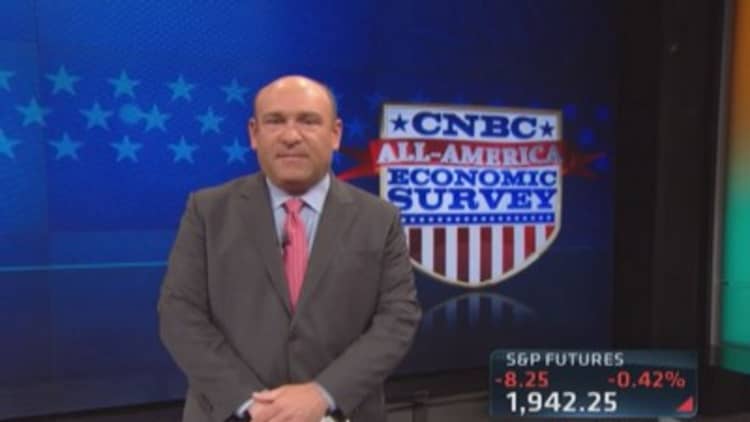
After seven long years of sharp recession and tepid recovery, the CNBC All-America Economic Survey found some key measures of U.S. public opinion finally regained their precrisis levels.
Ninety-one percent of Americans now believe their home prices will either be stable or rise over the next year, the highest since March 2007. And for the first time in three years, Americans picked real estate ahead of gold as the best investment.
Respondents also said they will spend about as much on a summer vacation as they did before the recession, following a sharp drop during the financial crisis.
Read MoreUS foreclosures at 8-year low
That optimism comes with greater hopes among respondents for their paychecks: Thirty-eight percent believe their wages will rise in the next year, the highest percentage since December 2008.
Meanwhile, pessimism declined. Only 33 percent of those polled judge the current state of the economy as poor, equaling the December 2007 low and a five-point decrease from the March study's results.
The survey of 815 people across the country had a margin of error of plus or minus 3.4 percent. It was conducted in early June by the Democratic polling firm Hart Research Associates and the Republican polling firm Public Opinion Strategies.
The survey wasn't all good news, though. It also showed that some critical measures of optimism continue to lag. Just 18 percent say the economy is good or excellent, virtually unchanged from March and eight points below the prerecession level.
Americans expect home price gains of just 2.2 percent over the next year, a little more than half of the expectation from the more optimistic days in 2007. The outlook for wage gains is a healthy 3.5 percent for the postrecession period. But before 2008, Americans regularly expected wage gains between 5 percent and 7 percent annually.
Read MoreThis indicator points to falling home prices
The survey results follow a report by the U.S. government that the number of domestic jobs in May had regained the peak level of January 2008.
The survey also found:
- Gold, which topped the poll as the most popular investment choice the past two years, has now fallen to third.
- About two-thirds of the public say men and women in their own workplace are paid the same for the same work, with just 22 percent saying men are paid more. But there's a 12-point gap between men and women, with 29 percent of women reporting unequal pay.
- Despite several months of better headlines, views on Obamacare remain as negative as ever.
- Support for raising the minimum wage remains steady compared with the last survey, with about two-thirds of the public backing a rise to $10.10.
- The more Americans know about the General Motors recall story, the less they like what they hear. Fifty-five percent of Americans who have heard a lot about the recall said it was handled poorly; 43 percent of that group said they are less likely to buy a GM car because of what they've heard.
- The outlook for economic growth remains muted, with 28 percent of respondents looking for improvement, 40 percent who expect the economy to remain the same and 28 percent who believe it will worsen.
- In contrast to the period before the recession, wealthier Americans aren't more optimistic than the poor or middle class. They are, however, more likely to believe the economy will remain the same and less likely to believe it will worsen. The most optimistic Americans are those who believe their home values will rise in the next year, Democrats and African Americans.
The survey shows the importance of real estate in the psyche of Americans. It was chosen as the No. 1 investment choice for the first time in three years, with people in the 18 to 49 age group among those most likely to favor real estate.
Stocks came out in second place, chosen by 27 percent as the best investment, followed by gold. Perhaps ominous for the precious metal, no group has soured more on gold than the wealthiest Americans. Just 14 percent of respondents with more than $100,000 in income picked gold as their top investment, down from 42 percent in 2012.
Despite better economic attitudes in the country, the Affordable Care Act has fared no better in public opinion. Just 30 percent gave the law positive marks, virtually unchanged since September 2013, while 47 percent viewed it negatively.
Strong, negative views of Republicans (82 percent) and mostly negative attitudes of Independents (52 percent) were not outweighed by the positive views of Democrats (59 percent).
Meanwhile, support for raising the minimum wage, another key issue for the Obama administration, remained steady compared with the last survey, with about two-thirds of the public backing a rise to $10.10. A 10-point increase last year among those who strongly support the increase was sustained in the survey.
Read MoreWhere have all the missing American workers gone?
There also seems to be broad support for addressing the issue of unequal pay for equal work among men and women. It was the top choice among five economic steps that Congress and the president should focus on this year, edging out raising the minimum wage.
The views on whether Washington should address the unequal pay issue break much more along gender lines than party lines—that is, the views of GOP women are much closer to Democrats than to GOP men. For GOP males, lowering the corporate tax rate was chosen as the top priority for Washington.
—By CNBC's Steve Liesman


